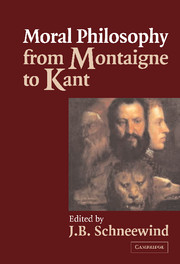Book contents
- Frontmatter
- Contents
- Preface
- Acknowledgments
- Foreword to the One-Volume Reprint
- Introduction
- PROLEGOMENA: SOME QUESTIONS RAISED
- PART I REWORKING NATURAL LAW
- PART II INTELLECT AND MORALITY
- Guillaume Du Vair
- René Descartes
- Benedict de Spinoza
- Nicholas Malebranche
- Ralph Cudworth
- Samuel Clarke
- Gottfried Wilhelm Leibniz
- Christian Wolff
- PART III EPICUREANS AND EGOISTS
- PART IV AUTONOMY AND RESPONSIBILITY
- Supplemental Bibliography
Nicholas Malebranche
Published online by Cambridge University Press: 05 June 2012
- Frontmatter
- Contents
- Preface
- Acknowledgments
- Foreword to the One-Volume Reprint
- Introduction
- PROLEGOMENA: SOME QUESTIONS RAISED
- PART I REWORKING NATURAL LAW
- PART II INTELLECT AND MORALITY
- Guillaume Du Vair
- René Descartes
- Benedict de Spinoza
- Nicholas Malebranche
- Ralph Cudworth
- Samuel Clarke
- Gottfried Wilhelm Leibniz
- Christian Wolff
- PART III EPICUREANS AND EGOISTS
- PART IV AUTONOMY AND RESPONSIBILITY
- Supplemental Bibliography
Summary
Introduction
Born in Paris in 1638 into a prosperous and well-connected family, Malebranche studied theology at the Sorbonne and entered the religious order of the Oratory in 1660. It was a reading of Descartes's treatise On Man in 1664 that awoke his philosophical interests. His first, and in many ways his most important, book, De la recherche de la vérité (The Search for Truth), published in two volumes in 1674 and 1675, showed the intermingling of religious concern with philosophical argument that was characteristic of all of Malebranche's thought. In later books he presented arguments for the truth of Christianity, discussed the relations between nature and grace, and explained his theory in graceful dialogues. The Traité de morale (Treatise of Morality) was published in 1684.
Malebranche lived during a period of stormy religious controversy and spent much time replying to his critics and criticizing others in turn. Leibniz, his slightly younger contemporary, and Antoine Arnauld, the logician and controversialist of the Port Royal Jansenists, were among his antagonists. Eventually the religious authorities decided that Malebranche's views were dangerous, and two of his works – the Search for Truth and the Treatise on Nature and Grace – were put on the index of books forbidden by the Catholic church. Malebranche was widely read in his lifetime, and his major works were translated into English. Admired by Berkeley and Hume, he exercised a not inconsiderable influence on British thought. He died in 1715.
- Type
- Chapter
- Information
- Moral Philosophy from Montaigne to Kant , pp. 256 - 274Publisher: Cambridge University PressPrint publication year: 2002

